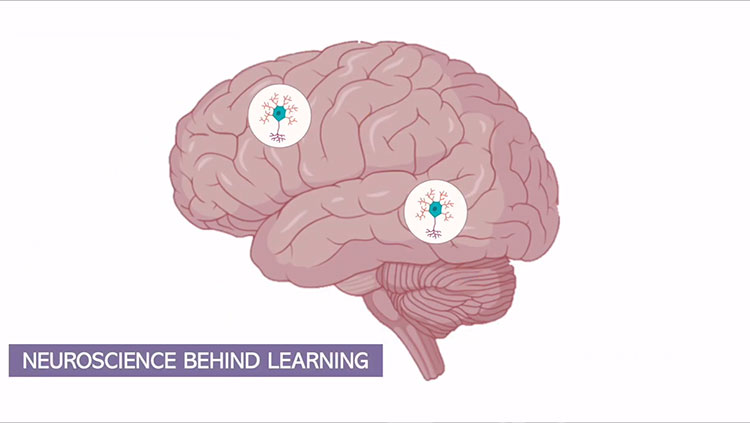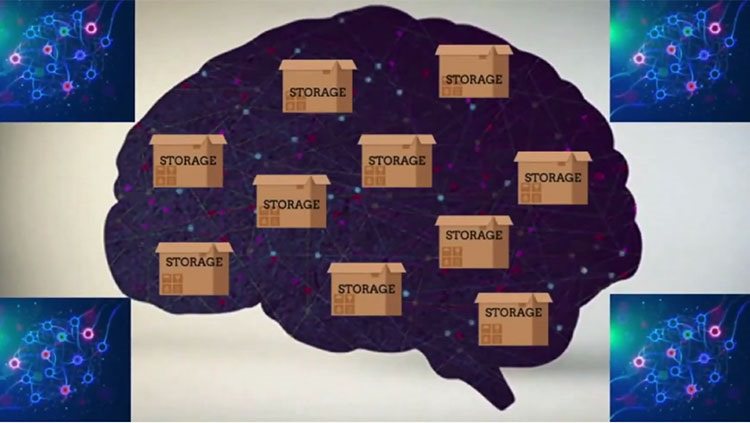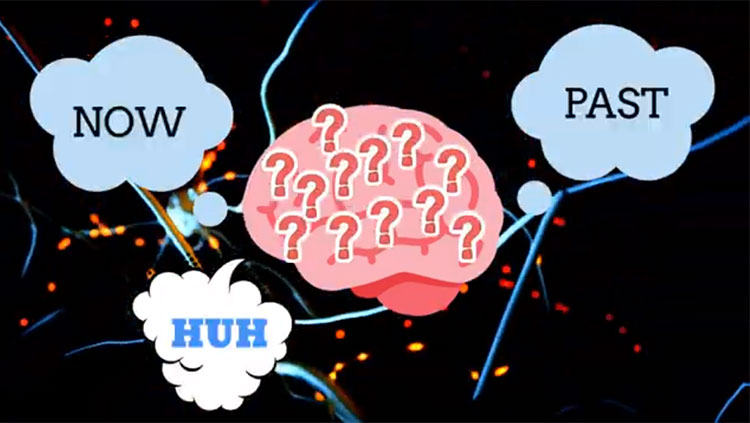How Can We Enhance Working Memory?
- Published20 May 2013
- Author Bradley Voytek
- Source BrainFacts/SfN
Even a seemingly simple behavior -- like trying to remember if the name of the person you just met is "Elizabeth" or "Patricia"--can tax our memories. These short-term memory drains are part of what we neuroscientists call "working memory".
When you think about it, it's quite a remarkable neural feat that we can do this at all! Somehow our brains are able to take in information (like the sound waves that hit our ears in just the right way to make us perceive the sound that is the name "Patricia"), hold that information in some neural pattern/buffer/code, and then retrieve that information at will (if we're lucky).
More technically, this remarkable ability requires us to construct and hold an internal model of a real-world stimulus that we then later compare against something else.
As a neuroscientist whose research focuses in part on how the human brain can actually do this, I will often get asked how one might improve their less-than-optimal working memory.
While it sucks to say it, there is no clear "most effective" way, but the methods that have shown promising successes are:
- brain training
- medication
- brain stimulation

But for now, I'm sad to say, nothing's gonna turn you into Eddie Morra from Limitless quite yet... First, a big disclaimer: this is a very complex field because "working memory" isn't one single process controlled by one brain region, but it does appear to be critically reliant on the dorsolateral prefrontal cortex (and many others depending on whether the memory to be remembered is visual, auditory, olfactory, a life event, and so on). It's also intricately linked to attention and other cognitive processes.
Check out the relationships to different cognitive tasks and working memory according to brainSCANr:
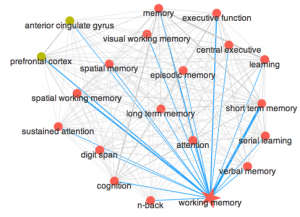
This interconnectivity between cognitive factors and brain regions motivates a lot of the neuroscience behind working memory improvement. As you can see, we know that general features of cognition "share" the same brain areas. That is, damage to various parts of the prefrontal cortex, for example, leads to impairments to working memory, attention, fluid reasoning, set-shifting, emotional regulation, and so on.
Given that things such as attention and working memory are so intimately related (both neuroanatomically and psychologically), we would like to think that improving one would improve the other. If we could improve intelligence, would that enhance our working memory as well? Or is working memory just a factor of intelligence?
There are many ways of studying working memory. A classic example is the use of the n-back task. This is a type of serial working memory task wherein a person must hold a series of information in memory. The simplest version of the task, the 0-back, requires the person to respond every time they see the target stimulus. At 2-back, the task becomes very difficult. In the 2-back version below, for example, correct responses would be to the second and third Cs, because in both cases there was a C 2-letters prior.
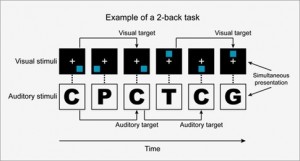
If presented with the following letters:
A D E Q E X S C E C T M T P W
then correct responses would be for the letters in bold:
A D E Q E X S C E C T M T P W
This is but one of many forms of experimentally testing working memory.
Brain Training
There are several online systems for brain training, which aim to enhance cognitive performance (including working memory), such as Lumosity, Posit Science, and many others.
Some research has shown that fluid intelligence (which is a catch-all term) can be improved with working memory training (Improving fluid intelligence with training on working memory, PNAS 2008):
Fluid intelligence (Gf) refers to the ability to reason and to solve new problems independently of previously acquired knowledge. Gf is critical for a wide variety of cognitive tasks, and it is considered one of the most important factors in learning... Although performance on tests of Gf can be improved through direct practice on the tests themselves, there is no evidence that training on any other regimen yields increased Gf in adults. Furthermore, there is a long history of research into cognitive training showing that, although performance on trained tasks can increase dramatically, transfer of this learning to other tasks remains poor. Here, we present evidence for transfer from training on a demanding working memory task to measures of Gf. This transfer results even though the trained task is entirely different from the intelligence test itself. Furthermore, we demonstrate that the extent of gain in intelligence critically depends on the amount of training: the more training, the more improvement in Gf. That is, the training effect is dosage-dependent. Thus, in contrast to many previous studies, we conclude that it is possible to improve Gf without practicing the testing tasks themselves, opening a wide range of applications.
This issue of transfer is important, because it's easy to show that training someone on a working memory task can improve performance on that task, but does that improvement generalize to other aspects of cognition?
When you ask "What is the most effective way to enhance working memory?" you probably don't really care about just improving working memory. You want to be smarter all around! Given that things such as attention and working memory are so intimately related, we would think that training would transfer between them, but the evidence is still quite murky. For example, there was recently a big study that got a lot of media coverage (Putting brain training to the test, Nature 2010) that found that:
‘Brain training’, or the goal of improved cognitive function through the regular use of computerized tests, is a multimillion-pound industry, yet in our view scientific evidence to support its efficacy is lacking. Modest effects have been reported in some studies of older individuals and preschool children, and video-game players outperform non-players on some tests of visual attention. However, the widely held belief that commercially available computerized brain-training programs improve general cognitive function in the wider population in our opinion lacks empirical support. The central question is not whether performance on cognitive tests can be improved by training, but rather, whether those benefits transfer to other untrained tasks or lead to any general improvement in the level of cognitive functioning. Here we report the results of a six-week online study in which 11,430 participants trained several times each week on cognitive tasks designed to improve reasoning, memory, planning, visuospatial skills and attention. Although improvements were observed in every one of the cognitive tasks that were trained, no evidence was found for transfer effects to untrained tasks, even when those tasks were cognitively closely related.
(emphasis mine)
Contrast this with a review from the following year (Does working memory training work? The promise and challenges of enhancing cognition by training working memory. Psychon Bull Rev 2011) that broke training into strategy and core training:
Strategy training paradigms involve teaching of effective approaches to encoding, maintenance, and/or retrieval from WM. The primary aim of most strategy training studies is to increase performance in tasks requiring retention of information over a delay. In strategy training studies, experimenters introduce participants to particular task strategies, and then provide practice sessions encouraging the strategy of interest. Some strategy training programs aim to increase reliance on, and facility with, articulatory rehearsal,while other programs aim to train elaborative encoding strategies...
Core training studies typically involve repetition of demanding WM tasks that are designed to target domain-general WM mechanisms. To achieve this purpose, core training paradigms are commonly designed to: 1) limit the use of domain-specific strategies, 2) minimize automization, 3) include tasks/stimuli that span multiple modalities, 4) require maintenance in the face of interference, 5) enforce rapid WM encoding and retrieval demands, 6) adapt to participants’ varying level of proficiency, and 7) demand high cognitive workloads or high intensity cognitive engagement (though different studies place variable emphasis on these factors). Tasks utilized in core training programs also commonly involve sequential processing and frequent memory updating.
The authors conclude:
In particular, core WM training studies seem to produce more far-reaching transfer effects, likely because they target domain-general mechanisms of WM. The results of individual studies encourage optimism regarding the value of WM training as a tool for general cognitive enhancement. However, we discuss several limitations that should be addressed before the field endorses the value of this approach.
Medication
The issue of using medication for cognitive enhancement is very contentious, however I will not discuss the ethics here. In 2008, Nature ran a commentary on this topic: Towards responsible use of cognitive-enhancing drugs by the healthy in which the authors outline the evidence in favor of the efficacy of "smart drugs" (nootropics):
Many of the medications used to treat psychiatric and neurological conditions also improve the performance of the healthy. The drugs most commonly used for cognitive enhancement at present are stimulants, namely Ritalin (methyphenidate) and Adderall (mixed amphetamine salts), and are prescribed mainly for the treatment of attention deficit hyperactivity disorder (ADHD). Because of their effects on the catecholamine system, these drugs increase executive functions in patients and most healthy normal people, improving their abilities to focus their attention, manipulate information in working memory and flexibly control their responses...
A newer drug, modafinil (Provigil), has also shown enhancement potential. Modafinil is approved for the treatment of fatigue caused by narcolepsy, sleep apnoea and shift-work sleep disorder. It is currently prescribed off label for a wide range of neuropsychiatric and other medical conditions involving fatigue as well as for healthy people who need to stay alert and awake when sleep deprived, such as physicians on night call. In addition, laboratory studies have shown that modafinil enhances aspects of executive function in rested healthy adults, particularly inhibitory control. Unlike Adderall and Ritalin, however, modafinil prescriptions are not common, and the drug is consequently rare on the college black market. But anecdotal evidence and a readers' survey both suggest that adults sometimes obtain modafinil from their physicians or online for enhancement purposes.
A modest degree of memory enhancement is possible with the ADHD medications just mentioned as well as with medications developed for the treatment of Alzheimer's disease such as Aricept (donepezil), which raise levels of acetylcholine in the brain. Several other compounds with different pharmacological actions are in early clinical trials, having shown positive effects on memory in healthy research subjects. It is too early to know whether any of these new drugs will be proven safe and effective, but if one is it will surely be sought by healthy middle-aged and elderly people contending with normal age-related memory decline, as well as by people of all ages preparing for academic or licensure examinations.
(emphasis mine)
Regarding the last class of drugs -- the cholinergic drugs -- my friend Ariel Rokem published a paper on the effect of Aricept on visual perceptual learning (Cholinergic enhancement augments magnitude and specificity of visual perceptual learning in healthy humans, Curr Biol 2010):
Acetylcholine (ACh) has been suggested to regulate learning by enhancing the responses of sensory cortical neurons to behaviorally relevant stimuli. In this study, we increased synaptic levels of ACh in the brains of healthy human subjects with the cholinesterase inhibitor donepezil (trade name: Aricept) and measured the effects of this cholinergic enhancement on visual perceptual learning. Each subject completed two 5 day courses of training on a motion direction discrimination task, once while ingesting 5 mg of donepezil before every training session and once while placebo was administered. We found that cholinergic enhancement augmented perceptual learning for stimuli having the same direction of motion and visual field location used during training. In addition, perceptual learning with donepezil was more selective to the trained direction of motion and visual field location. These results, combined with previous studies demonstrating an increase in neuronal selectivity following cholinergic enhancement, suggest a possible mechanism by which ACh augments neural plasticity by directing activity to populations of neurons that encode behaviorally relevant stimulus features.
(emphasis mine)
But again, remember the caveats about transfer in training: just because a drug enhances one aspect of cognition (visual perceptual learning) does not mean it will transfer to others (e.g. working memory).
Another recent study published in Nature (A critical role for IGF-II in memory consolidation and enhancement, 2011) showed that another type of drug, insulin-like growth factor II, enhances memory in rats:
We report that, in the rat, administering insulin-like growth factor II (IGF-II, also known as IGF2) significantly enhances memory retention and prevents forgetting. Inhibitory avoidance learning leads to an increase in hippocampal expression of IGF-II, which requires the transcription factor CCAAT enhancer binding protein β and is essential for memory consolidation. Furthermore, injections of recombinant IGF-II into the hippocampus after either training or memory retrieval significantly enhance memory retention and prevent forgetting. To be effective, IGF-II needs to be administered within a sensitive period of memory consolidation. IGF-II-dependent memory enhancement requires IGF-II receptors, new protein synthesis, the function of activity-regulated cytoskeletal-associated protein and glycogen-synthase kinase 3 (GSK3). Moreover, it correlates with a significant activation of synaptic GSK3β and increased expression of GluR1 (also known as GRIA1) α-amino-3-hydroxy-5-methyl-4-isoxasolepropionic acid receptor subunits. In hippocampal slices, IGF-II promotes IGF-II receptor-dependent, persistent long-term potentiation after weak synaptic stimulation. Thus, IGF-II may represent a novel target for cognitive enhancement therapies.
Brain Stimulation
This is seriously DO NOT TRY THIS AT HOME territory.
Lately there's a lot of excitement surrounding a method for safely and non-invasively stimulating brain areas that might help improve our working memory abilities. A cool study published in Clinical Neurophysiology (Improving working memory: Exploring the effect of transcranial random noise stimulation and transcranial direct current stimulation on the dorsolateral prefrontal cortex, 2011) showed that transcranial direct current stimulation (tDCS) of the dorsolateral prefrontal cortex (a brain region known to be critical for maintaining items in working memory) may enhance working memory. tDCS is a simple system wherein a low current is passed between two electrodes on the scalp, inducing a current between them intracerebrally. The researchers of that study report that:
There was significant improvement in speed of performance following anodal tDCS on the 2-back WM task; this was the only significant finding... The results do not provide support for the hypothesis that tRNS improves WM. However, the study does provide confirmation of previous findings that anodal tDCS enhances some aspects of DLPFC functioning. Methodological limitations that may have contributed to the lack of significant findings following tRNS are discussed.
So does working memory enhancement work? Short answer: Yes! Real answer: It depends on what you mean by "works".
As you can see, the research is really murky and scientists are still debating whether theses techniques are "enhancing" working memory specifically, or if they're more generally improving intelligence, or some subset of cognitive functions. Do these enhancements last longer than it takes to run a study in the lab? Are there any "costs" to cognitive enhancement?
The research so far is promising, but sadly we're a long way from being Limitless.
(Note: Portions of this post first appeared on my scientific blog.)
CONTENT PROVIDED BY
BrainFacts/SfN




